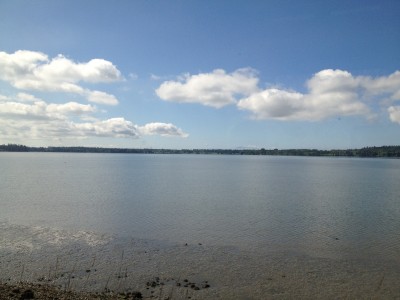Yesterday, Aimee Samara and I began planning a session that we will host on powerful questions. We will offer it at Transforming the Way We Lead: And Art of Hosting Intensive in Portland, Oregon. There are a total of 50 of us gathering for three days together.
Aimee and I did not get as far as our final design. But where we left off is with a series of partner and four-person conversations that will invoke this learning among participants:
Curiosity — Asking good questions is definitely a skill. However, it is also a disposition. It comes from a curiosity, I believe. Curiosity about how things work. About what is seen and what is not seen. I’m reminded again of my grad school professor Bonner Ritchie who helped me to learn, “there is always more unseen that there is seen.” Or, “in every new truth, there is more that is not true about that than there is true about that.” Aimee and I will likely ask participants to share a story of a time when they felt intensely curious and ask them to describe what that was like.
Pocket Questions — These are the kind of questions that you can carry with you and use frequently, applied to personal, group, and system wide levels of scale. I asked Aimee what she considered as her pocket questions. “What is our purpose?” “Is there anything that you are afraid of?” I shared some of mine. “What if…?” “What could _____ also be?”
Your Key Question for this Event — It’s an important moment to identify, or get more clear, on what that question is. It’s a good harvest so as to shape what people will pay attention to for the remainder of the learning and time together.
I recall a story that I heard through my friend Toke Moeller many years ago. I imagine ending with this story today.
The power of questions
”You can eat an apple,” I said and gave him the green fruit.
It was as if he had seen an apple for the first time. First he just held it there and smelled it, but then he took a little bite.
”Mmmm,” he said and took a bigger bite.
”Did it taste good?” I asked.
He bowed deeply.
I wanted to know how an apple tastes the very first time you taste it, so I asked again, ”How did it taste?”
He bowed and bowed.
”Why do you bow?” I asked.
Mika bowed again. It made me feel so confused, that I hurried to ask the question again. ”Why do you bow?”
Now it was him who became confused. I think he did not know if he should bow again or just answer. ”Where I come from we always bow, when someone asks an interesting question,” he explained, ”and the deeper the question, the deeper we bow.”
That was the strangest thing I had heard in a long time. I could not understand that a question was something to bow for. ”What do you do when you greet each other?”
”We always try to find something wise to ask?” he said.
”Why?”
First he bowed quickly, because I had asked another question and then he said, ”We try to ask a wise question to get the other person to bow”.
I was so impressed by the answer that I bowed as deeply as I could.
When I looked up Mika had put his finger in his mouth. After a long time he took it out.
”Why did you bow?” he asked and looked insulted.
”Because you answered my question so wisely,” I said.
Now he said very loudly and clearly something that has followed me in my life ever since. ”An answer is nothing to bow for. Even if an answer can sound ever so right, still you should not bow to it.”
I nodded briefly. But I regretted it at once, because now Mika may think that I bowed to the answer he had just given.
”The one who bows shows respect”, Mika continued, ”You should never show respect for an answer.”
”Why not?”
”An answer is always the part of the road that is behind you. Only questions point to the future.”
Those words were so wise, I thought, that I had to press my hands against my chin not to bow again…– Jostein Gaarder, 1996 in Norway

